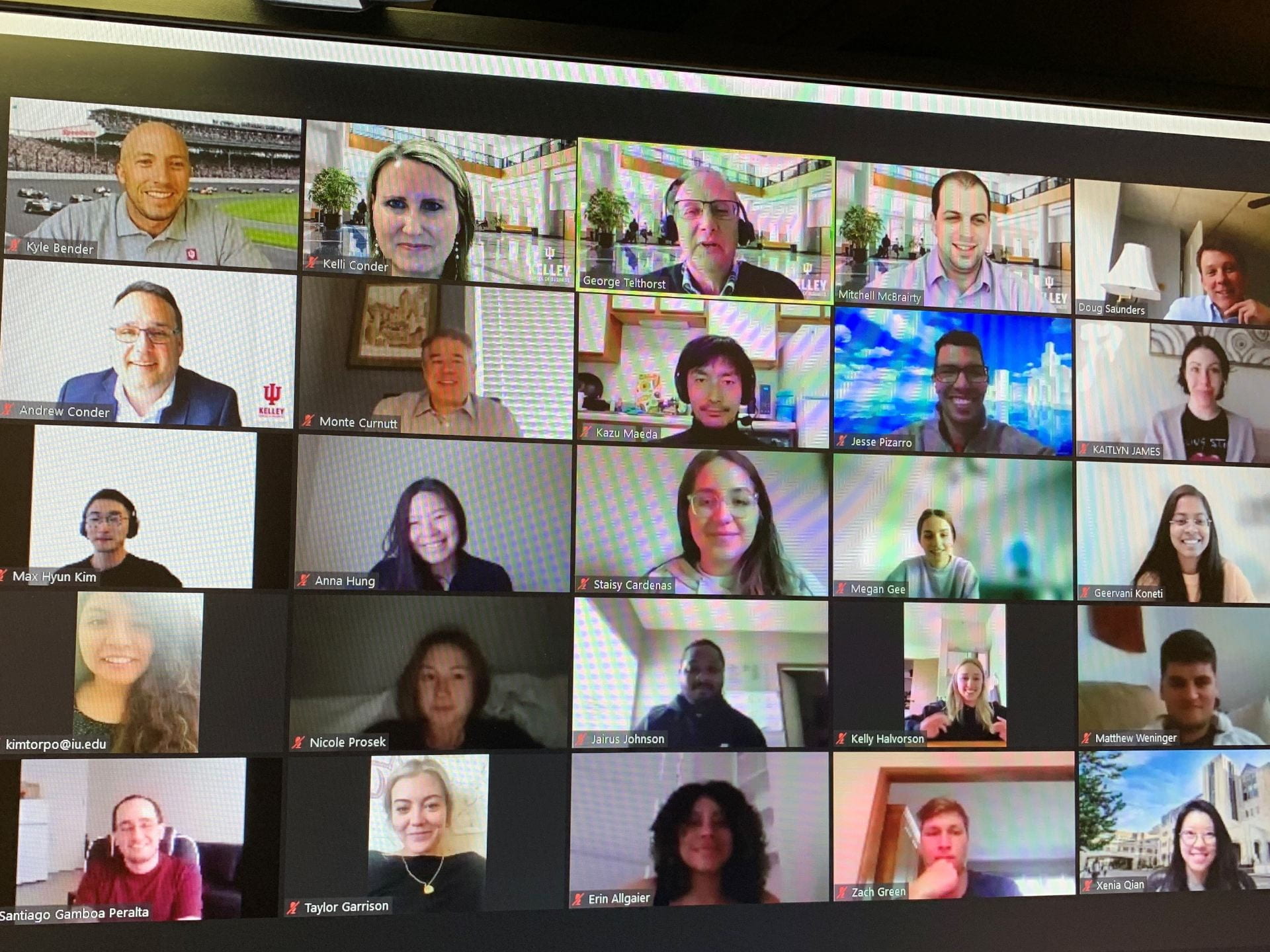Summary by Mitchell McBrairty, MBA Class of ’21
From ideation to launch, the process of defining a product pipeline is critical to building a sustainable business. It defines what customers will be served and how to continually add value with every product lifecycle. In this year’s version of Life Science Day hosted by the IU Kelley School of Business Center for Business in Life Sciences, we explored the topic of New Product Pipelines in the healthcare industry.

2021 Life Science Day speakers and participants
The discussion was led by a panel of experts in the field that included:
Andrew Conder, Director, Global Product Management Critical Care, Cook Medical
Monte Curnutt, VP, Corporate Development, Roche Diagnostics
Doug Saunders, Director of Public Policy, Anthem
Derek Hicks, Head of Business Development, Spark Therapeutics
These speakers gave us a unique perspective from different points along the healthcare value chain, including medical devices, pharmaceuticals, diagnostics, and health insurance services.
A product pipeline is a balancing act, with the need to deliver short-term value while maintaining a long-term vision. It was interesting to learn more about how this compares across the different sectors, which operate on very different timelines for their product lifecycles. For example, pharmaceutical development often takes more than a decade to advance a medicine through clinical trials while medical devices are upgraded much more frequently. Covid-19 has also put extreme external pressure to accelerate these timelines, with our panelist from Roche diagnostics sharing that they have released new covid-19 tests in a span of months that would normally have taken years.
Advancing these products through the pipeline also requires close interactions with the regulatory bodies that oversee each of these sectors. It was fascinating to learn about how much data must be collected in the healthcare industry to make the case to regulators that the products are safe to use. This data is not always easy to collect and requires a carefully planned strategy that combines in-house research with data from external sources. In the health insurance sector, our panelist from Anthem explained that they must be compliant on a state-by-state basis in addition to the federal oversight, and they have offices in every state they provide products to deal with the complexities of dealing with regulations.
Even with careful planning, the reality is that sometimes products in the pipeline don’t work out as planned and difficult decisions must be made about whether to change course or to end a program entirely. This was one topic that the panelists unanimously agreed on: a major factor they consider for the decision to kill a program in the product pipeline is the impact it will have on the final patient. Some projects will even take a loss if they are meant to address an unmet medical need or improve patient’s access to healthcare because it is the right thing to do. However, there are always many products to pursue and limited resources available, so prioritization decisions that make difficult tradeoffs are a central part of crafting the overall pipeline.
Digitalization has also changed the way that healthcare companies develop and deliver new products. In the age of big data, we can now rapidly generate new insights into patient health that can be translated into new products. The introduction of telehealth and other digital services has also changed the way we think about the delivery of healthcare, and it will be interesting to see moving forward how the different sectors in the industry embrace digitalization to improve patient outcomes and experience.
We truly appreciate each member of our panel for giving back to all of us students at IU with this great discussion! Also, special thanks to Kelley alumni John Voris and John Workman for their support of the event!
The conference ended with a celebration of the MBA, MSHM, graduate, and undergraduate students that have received the certificate in the business of life sciences. As a member of this class, I can say that it was a pleasure to work alongside such great minds working on impactful projects. It prepared us well as we continue to build our careers in this industry.
Congratulations to the following students for completing their coursework to earn the Certificate in the Business of Life Sciences issued by the Center for the Business of Life Sciences at the IU Kelley School of Business.

MBA Students
Kyle Bender Geervani Koneti Jesse Pizarro Qi Sun
Jackson Elliott Matthew Lee Sarah Prokai
Anna Hung Kazuya Maeda Xenia Qian
Robert Kobey Mitchell McBrairty Julio Soriagalvarro
Graduate Science Students
HynAh Kim
Lekeah Durden
Tyrese Taylor
Masters in Healthcare Management Students
Erin Allgaier Elizabeth Grimes Garrett Smiley Alexis Woods
Mayesha Awal Kaitlyn James Cecelia Stonner
Lindsey Biggs Jarius Johnson Matthew Weninger
Staisy Cardenas Blessing Okendu Heather Wenz
Undergraduate Business & Sciences Students
Alexa Akers James Gashler Nicole Prosek
Carson Baker Zach Green Chloe Slen
Matthew Bardon Kelly Halvorson Kimberly Torpoco
Noah Couch Cristian Lee Hsiao Jeanette Weber
Taylor Garrison Isabella Imlay Hangming Zhang
Eric Orona-Rodiguez
Leave a Reply